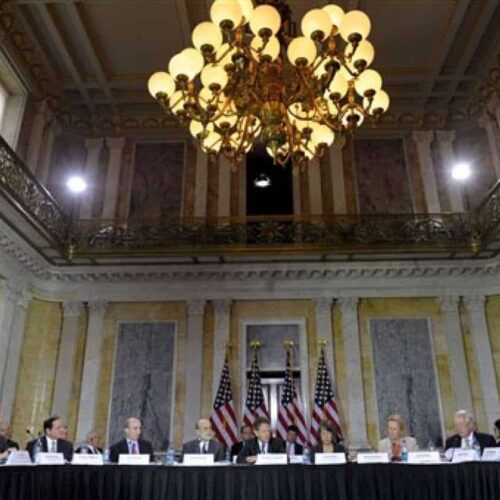Introduction
The Financial Stability Oversight Council (FSOC), comprised of U.S. regulators of financial services, warned Congress of the continued fragility of the U.S. financial system and called for increased protection in several key areas.
Those areas included the $2.7 trillion short-term funding market known as the “triparty repo” market, as well as money-market mutual funds, the council said in its first annual report. The repo market temporarily froze during the 2008 financial crisis and drained a key source of funding for investment companies and banks, the Wall Street Journal reports. FSOC recommended that the Securities and Exchange Commission increase stability in money-market funds by changing from a fixed to floating share price, and imposing capital standards to absorb losses.
FSOC also warned that the United States faces potential losses connected with the European debt crisis. Any assumptions of market stability, the report said, should be met with “a heavy dose of skepticism.”
Stressed hedge fund managers – Billionaire investor George Soro is returning $1 billion to outside investors so that he can avoid registering his giant investment fund with the Securities and Exchange Commission. Instead, he will now manage the fund – worth $25 billion – as a family business.
The move is “an unfortunate consequence” of the Dodd-Frank financial regulations, Soros wrote in an investor letter. Under rules adopted since the Dodd-Frank reform law, a fund must register with the SEC unless it manages investments for a single family.
Marketwatch reports that Soros is the latest investor to return outside investor funds, but the first to connect the decision with SEC registration requirements. Previously, activist investor Carl Icahn explained his decision by saying he didn’t wish “to be responsible to limited partners through another possible market crisis,” while investor Stanley Druckenmiller said he was “dissatisfied” with his performance at Duquesne Capital Management.
The move by Soros seems to be “not simply about the registration, but the greater uncertainty as to who will come under scrutiny and exactly how the rules apply,” said Anthony Michael Sabino, a professor at St. John’s University’s Peter J. Tobin College of Business. “We still have a long way to go before we can fully understand all the ramifications of Dodd-Frank.”
Debt debate inspires rap video – With less than a week for Congress and the White House to prevent the United States from defaulting on its debt, comedian Remy Munasifi is circulating a music video urging action. “Raise the debt ceiling, raise the debt ceiling,” he raps in a music video called – what else — “Raise the Debt Ceiling.”
Munasifi, wearing a track suit, black cap, and dollar-sign bling, throws U.S. currency around as he explains, “$14 trillion in debt, but yo we ain’t go no qualms. Dropping $100 bills and million-dollar bombs. Social Security surplus? Oh guess what? It’s gone.”
The video was posted by Reason.TV, a website affiliated with the libertarian magazine Reason. It is the third in a series of collaborations between Munasifi and Reason TV. Munasifi concludes by urging quick government action: “Our debt is more unsustainable than my rap career.”
Consumer complaints – The most frequent consumer complaint in 2010 was for misleading information in selling new or used cars, faulty repairs, and towing disputes, according to an annual survey of state, county and city agencies from 18 U.S. states. The No. 2 complaint was for credit- and debt-related problems such as debt relief services, credit repair, abusive debt collection tactics, mortgage-related fraud, and billing disputes.
The survey by the Consumer Federation of America, National Association of Consumer Agency Administrations, and the North American Consumer Protection Investigators added a new category to the top 10 complaints: fraud. This group of complaints was for bogus sweepstakes and lotteries, work-at-home schemes and other scams.
The survey also collected suggestions to protect consumers. These ranged from tougher laws to curtail abusive debt collection practices to imposing stiff monetary penalties if landlords knowingly rent property that is or is about to be in foreclosure.
Read more in Inequality, Opportunity and Poverty
Finance
No unemployment worries for bank lobbyists in Washington, where business is booming
Your Wall Street reform daily reading list
Finance
Credit rating execs short on debt plan specifics for small audience at House hearing
S&P president says downgrade not the same as default




Join the conversation
Show Comments